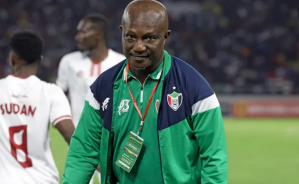
Sudan’s national football team remarkably qualified for the 2025 Africa Cup of Nations (Afcon) despite an on-going civil war that has engulfed the country for nearly two years. The team’s head coach, Ghanaian Kwesi Appiah, gave “glory to God” for the qualification amidst a devastating civil war and stiff competition from other teams.
“We give God the glory for bringing smiles to the people of Sudan through this #AFCON qualification,” posted Appiah on his Instagram account.
Sudan and 23 other teams including Nigeria, Mali, South Africa, Tanzania, Senegal, Cameroon and hosts Morocco will battle it out to lift the continent’s most prized football trophy from mid-January 2025. Sudan’s football team, known as ‘Falcons of Jediane’ finished second in their group ahead of Niger and Ghana.
64-year-old Appiah, who is a former Ghana Black Stars coach and former footballer, guided Sudan in a barren draw in Accra and a 2-0 win over his home country Ghana. In an interview with BBC, Appiah said his wish would have been to see both Sudan and Ghana qualify for Afcon but he added that “once you are a professional, you look at where you’re working. If Ghana is not rising to the occasion, there’s nothing I can do.”
The Falcons of Jediane are also well positioned to qualify for the 2026 World Cup sitting at the top of their qualifying group ahead of heavyweights Senegal, DR Congo and Togo.
Sudan’s on the pitch stellar performance has been even more impressive as it is the only team that has not had the advantage of playing at home. Football pitches in the capital Khartoum and other cities have either been destroyed in the war, used as humanitarian centres or worse, turned into burial sites. Neighbouring Libya and South Sudan have hosted Sudan’s ‘home’ matches with the team training from Saudi Arabia or Morocco. The national football league was suspended when the war broke out meaning the coach had a smaller pool of players to select from.
Additionally, basic infrastructure such as roads, hospitals and schools have been destroyed in the war between the Sudanese army and the Rapid Support Forces militia which has claimed an estimated 150,000 lives and displaced close to 12 million people in what the United Nations terms as the “worst humanitarian crisis on earth.”
Most of the players have lost close relatives and friends in the war while others have been separated from their families. But the dire conditions in Sudan have not dampened the resolve of the team or Appiah’s, who has now set his sight on ensuring the team performs well at Afcon and qualifies for the World Cup.
“By God’s grace, we have qualified (for Afcon). We will prepare very well and ensure that we have a strong team…as I have already stated, any competition we enter, we will go all out to win. I don’t believe in the idea of taking part in a competition with the mindset that you think you’ll be eliminated in the first round. Instead, once you’re in, you aim for the cup rather than coming out with nothing,” said Appiah.
Another feather on the cap is his recently published autobiography where he has put together nearly 40 years of playing and coaching football. In ‘Leaders don’t have to yell - National team coaching on leading high-performance teams’, Appiah takes the reader on a journey of deep valleys and peak mountains of his professional football career.
“I have learned from my victories and my defeats. I have learned in the secure times and in the uncertain times. I have learned from the praise and the appreciation, and I have also learned from the resistance and the criticisms. Above all, I have learned how to live with and work with people, and how to lead people gracefully through normal and difficult times,” reads part of the book’s introduction.
Appiah ultimately hopes that the Sudan football team will unite the divided country, “maybe through football the war might even come to an end,” said Appiah, who coached the Ghana Black Stars to the 2014 World Cup and the 2019 Africa Cup.





